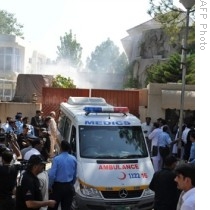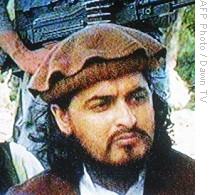Islamabad
06 October 2009
 |
| Pakistani security and medical personnel and media gather in front of UN office as smoke billows out after suicide blast in Islamabad, 05 Oct 2009 |
Taliban spokesman Azam Tariq contacted reporters by phone from an undisclosed location Tuesday, saying his group plans to target more foreign aid agencies in Pakistan.
He accused international organizations, such as the World Food Program, of promoting what he calls a Western agenda in the country.
WFP spokesman for Pakistan Amjed Jamal disagrees.
"We are a humanitarian organization," Jamal said. "We are working here for the people of Pakistan and for the people being affected by the acts of terrorism."
 |
| This television frame grab taken from Dawn TV on October 5, 2009, shows Pakistani Taliban chief Hakimullah Mehsud talking with media at an undisclosed location |
In the meeting with reporters, Mehsud promised that his fighters would carry out more attacks against local and foreign targets in the country.
Speaking to reporters in the capital Tuesday, Pakistani Interior Minister Rehman Malik said he believed that the Taliban carried out Monday's attack on the WFP offices in retaliation for the death of their former leader Baitullah Mehsud. Mehsud reportedly died in a suspected U.S. missile strike in August in South Waziristan.
Malik reiterated that the terrorist attacks would not discourage the military's campaign against Taliban and al-Qaida fighters in Pakistan's tribal areas, which border Afghanistan.
He also warned that he expects more terrorist attacks in the coming days, and he promised that security, particularly in the capital city, will remain on high alert.
Analysts believe the Pakistani military is on the verge of launching a major campaign in South Waziristan, where the Pakistani Taliban leadership is believed to be based.
Meanwhile, the military announced that the commander for international forces in Afghanistan, U.S. General Stanley McChrystal, met with Pakistani army chief, General Ashfaq Parvez Kayani, Tuesday on a previously unannounced visit to Rawalpindi.
The military did not release details of the meeting, but an official statement did say the two men "met for some time and discussed matters of professional interest."